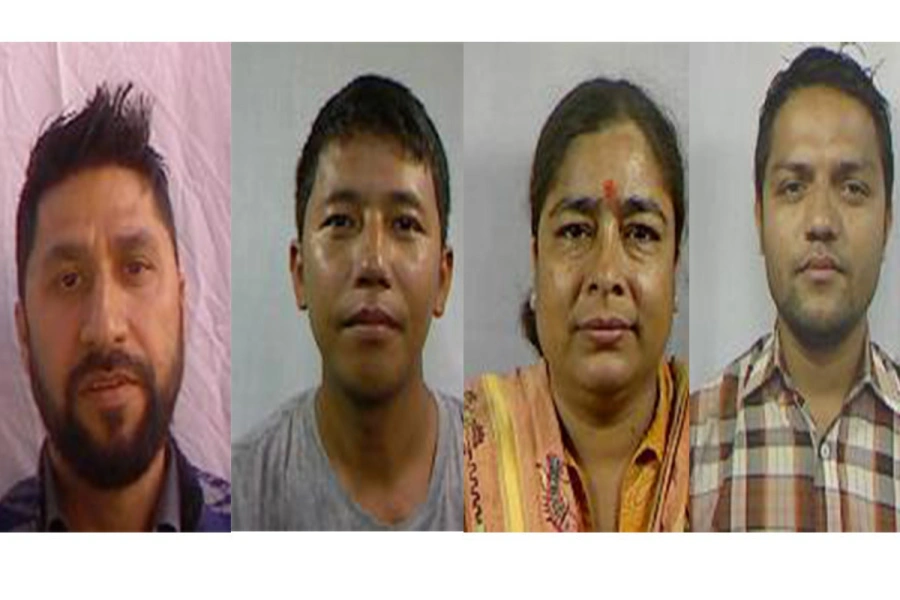KATHMANDU, Nov 17: Authorities from both Nepal and India have agreed to prioritize the formation of a joint task force to address the challenge of border security between the two countries.
This issue has been given priority in the ‘APF-SSB Eighth Coordination Meeting’ which began in Kathmandu from Saturday to further bolster the coordination between the Armed Police Force (APF) of Nepal and the Sashastra Seema Bal (SSB), the border security force of India. Both sides have started discussions on forming a joint task force to prevent the illegal entry of citizens of third countries through the Nepal-India border.
It is said that a meeting will be held at the APF Headquarters in Halchowk in the capital on Monday morning, where both sides are expected to reach an agreement to propose this matter to their respective ministries. The three-day meeting will discuss issues such as prevention and minimization of cross-border crimes, carrying out surveillance to control illegal activities, information exchange, and joint supervision of the border marker pillars, among other issues.
Over the past three years, the Indian side has pressured Nepal to prevent the illegal entry of Pakistani and Chinese nationals. In response, the Nepali side has also urged them to stop the increasing entry of Bangladeshi nationals and Rohingyas from Myanmar into Nepal through India.
After that request, both parties have discussed the matter of making a special proposal to form a joint task force for surveillance, control, monitoring, facilitation and information exchange in their respective bodies.
A senior APF officer said, “The Indian side is concerned about the entry of Pakistanis and Chinese. It is natural for Nepal to be concerned about Bengalis and Rohingyas.”
APF and SSB propose to form special task force to stop crime ac...

According to the senior officer, the authorities of both countries have a similar opinion about the surveillance of citizens who attempt to enter illegally from third countries. The meeting was led by APF Inspector General Raju Aryal, on behalf of Nepal, and SSB Director General Amrit Mohan Prasad on behalf of India. A team of nine people arrived in Nepal from India on November 15 under the leadership of Amrit Mohan Prasad.
On the first day of the meeting, Nepal raised the issue of drug smuggling and small arms smuggling with great importance. The Nepali side has also emphasized the establishment of a tourist assistance room.
Three years ago, the then Director General of SSB, Dr Sujoy Lal Thaosen proposed that Nepal stop citizens of third countries from entering India and stop their illegal activities. This issue was also raised by India last year.
The Indian side proposed to block the entry of Chinese and Pakistani nationals, claiming that people from these countries are using the land of Nepal to enter India with ill intentions due to the open border between India and Nepal.
However, this time, Nepal has urged that the Indian side should be responsible for screening the entry of Rohingya refugees. Nepal asked India to pay attention to the illegal entry of Bangladeshi nationals into Nepal as the political changes and instability in Bangladesh could impact Nepal as well. As a result, discussions have now begun on the concept of a joint task force to tackle these issues.
This time, the Nepali side made a significant effort to assure the Indian side with thorough preparation. After India expressed satisfaction with the actions taken by the APF in monitoring Nepali citizens attempting to enter India, the Indian side suggested facilitating the formation of a task force to monitor the entry of Bangladeshis and Rohingyas, and proposed to take the matter to the respective ministry for further consideration.
In response on behalf of Nepal, APF Inspector General Raju Aryal said that they are aware of such illegal activities and will take strict action if any are found. He further said that the APF is highly alert regarding Nepal’s security sensitivities and are particularly cautious to prevent any criminal activities using Nepali territory towards India.
APF Inspector General Aryal submitted the data of the past one year and said that such activities have been halted. India said that the movement of third country nationals has been restricted to some extent. Similarly, the entering of Nepali citizens into India has also been made stricter. It has also been proposed that the APF and the SSB should hold border security chief-level bilateral meetings twice a year on an alternate basis.
In the meeting, the two sides also discussed creating a separate mechanism for exchanging information to cover the entire 1,880 km long border between Nepal and India. According to the APF, apart from Karnali Province, 27 districts of six provinces of Nepal are connected with India, but information exchange is a major issue. According to Shailendra Thapa, Deputy Superintendent of Police (DSP) and co-spokesperson for the APF, the APF has set up 244 Border Outposts (BOPs) along the Nepal-India border.
He said that the proposed border security Gulm under the leadership of the DSP and the manpower under the leadership of inspectors and sub inspectors are being deployed at different places in the border area. In the current meeting, there has been significant discussion on the issue of cross-border crime and control of smuggling of drugs.
He also suggested taking all the information from there as the head of the peace and security division of the Ministry of Home Affairs participated in the meeting. The government has empowered the APF-SSB high-level mechanism to discuss only matters related to Kalapani in Darchula and Susta in Nawalparasi by formulating a common agenda. These two agendas were never discussed in the meeting.
A team of seven, including SSB chief Amrit Mohan Prasad, participated in the coordination meeting, while on the behalf of Nepal, the meeting was attended by the APF Inspector General Aryal, along with all the AIGs and the DIGs who command the East, mid, and Sudhurpaschim regions.
After the formal talks on Monday, a program has been scheduled for the signing of a joint memorandum of understanding between the two sides. Since 2012 (2069 BS), both countries have been holding the APF and SSB chief-level border security coordination meetings once a year.
The meetings mainly focus on further bolstering the discussions related to border security, prevention and control of cross-border crimes, controlling the infiltration of third-country nationals, and terrorism control.







































